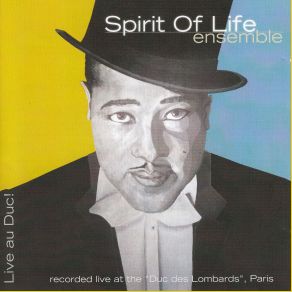Live Au Duc
Download links and information about Live Au Duc by Spirit Of Life Ensemble. This album was released in 2003 and it belongs to Jazz genres. It contains 12 tracks with total duration of 02:07:09 minutes.

|
|
|---|---|
| Artist: | Spirit Of Life Ensemble |
| Release date: | 2003 |
| Genre: | Jazz |
| Tracks: | 12 |
| Duration: | 02:07:09 |
| Buy it NOW at: | |
| Buy on iTunes $19.99 | |
Tracks
[Edit]| No. | Title | Length |
|---|---|---|
| 1. | Short Story (featuring Live Au Duc) | 14:09 |
| 2. | Wahalla (featuring Live Au Duc) | 8:13 |
| 3. | Blue Wild Flower (featuring Live Au Duc) | 12:58 |
| 4. | Tabarka (featuring Live Au Duc) | 10:20 |
| 5. | It Might As Well Be Spring (featuring Live Au Duc) | 6:03 |
| 6. | Happy Blues (featuring Live Au Duc) | 10:34 |
| 7. | Gossimer (featuring Live Au Duc) | 12:38 |
| 8. | Tears for Dolphy (featuring Live Au Duc) | 9:31 |
| 9. | Down In Brazil (featuring Live Au Duc) | 8:24 |
| 10. | East of Brazil (featuring Live Au Duc) | 12:56 |
| 11. | Song for My Father (featuring Live Au Duc) | 5:45 |
| 12. | Sackbut Nation - Carlito's Journey (featuring Live Au Duc) | 15:38 |
Details
[Edit]This 13-piece version of the Spirit of Life Ensemble (plus Raul de Souza — where has he been? — on trombone on "Carlito's Journey") was caught live in Paris at le Duc des Lombard jazz club on a couple of spring evenings near the turn of the 21st century. The miniature big band emphasizes the two percussionists, the vocal skills of Joe Lee Wilson (worth hearing if only for his style), and the fine improvisational skills of the horns, including a superb brass line of trumpeters Ted Curson and Vinnie Cutro and trombonist Bob Ferrel plus saxophonists Joe Ford and Frank Elmo. The results are upbeat and lively as the group weaves through a good mix of classics ("It Might as Well Be Spring"), would-be classics (Kenny Dorham's "Short Story"), and originals (with Ferrel's technically virtuosic "Sackbut Nation" taking the cake). The solos are uniformly on target, with Ford's distinctive alto sax, the vastly underrated Cutro's acerbic trumpet, and Ferrel's gutsy trombone the most consistently notable. While there are occasional misfires, such as the band's interpretation of "Down in Brazil," which seems to have been a crowd-pleaser but falls flat on its face artistically, the band generally infuses the tunes it plays with an avid, almost palpable enthusiasm, exhibiting the sort of locomotive drive and spirited energy that are often missing from the antiseptic emphasis on precision in the modern jazz ensemble. The band closes with a flag-waving arrangement of "Carlito's Journey," with an intensely on-track solo by saxophonist Frank Elmo and some fancy percussive footwork from Guilherme Franco and leader Daoud David Williams, although the sudden, final fade is off-putting.